Sunsets and Sunrise

Beez Neez now Chy Whella
Big Bear and Pepe Millard
Sun 7 Sep 2008 18:41
|
Sunsets and Sunrise
I have long held a passion for taking
photographs of sunsets, my first, on a cheap camera in 1972. I can now take
twenty shots of the same thing, deleting poorer shots off the laptop, as
opposed to saving for ages for film development at Boot's, once in a blue
moon. That first attempt, taken on Parliament Hill, whilst visiting Aunt Em
at 113 Chetwyn Road, Tufnell Park, London, was of a stalk of wild wheat, now
stuck in an album in storage. Em used too let out her top floor to student
doctors. One day I was telling Bear the story, next thing out
came the A-Z and he began studying it. " At that very time
I was living in a bedsit 5 roads away from your Aunt's" Some Saturday nights Bear drank in The Lord Palmeston, a
pub on the corner Chetwyn Road, he would have actually been in there on the
occasions we were visiting, when my two uncles took dad kicking and
screaming !!!!!!! for a pint. SPOOKY OR WHAT.
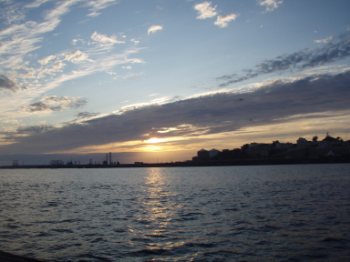 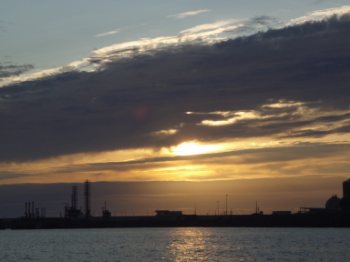
 A sunset can make romantic
just about anything, including these gasometers.
WHY ARE SUNSETS USUALLY MORE COLOURFUL
THAN SUNRISES ?
Throughout the night, water vapour in
the air tends to condense because the temperature goes down. By dawn, the air
has become clearer, containing less water vapour, and the scattering of the
Sun's rays is thus reduced making the sunrise not very colourful. In the evening
the opposite is true. Seawater has been evaporating all day due to solar
radiation and increased temperatures. By the evening the air has become thick
with water vapour, which increases the scattering of blue light rays and
reinforces the red colour of the setting Sun.
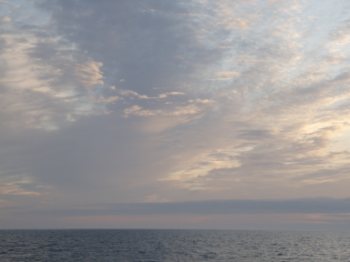 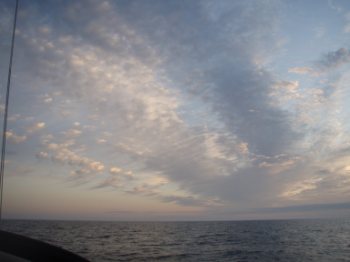
 The early part of a sunset shows
softer light, later becoming harder. A silhouette of my new sea fishing
rod.
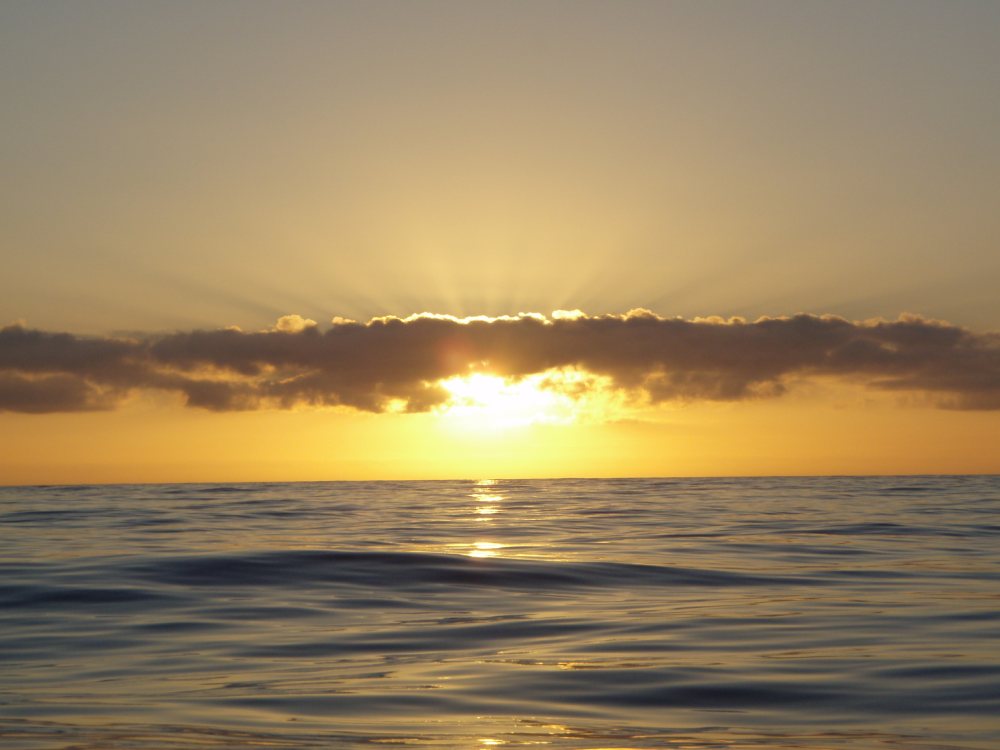 WHAT CAUSES THE BRIGHT RAYS SEEN IN A
SUNSET ?
These rays are called "Crepuscular
Rays". The rays themselves correspond to regions of the sky that are illuminated
by the Sun, which stand out brightly against clouds or mountains etc. These rays
are particularly noticeable when the air contains water droplets or dust
particles that strongly scatter the Sun's light. The rays are actually parallel
since they come from the Sun which, for all practicle purposes is at infinity
for us. But they appear to diverge from the Sun because of effect of
perspective, just as railroad tracks seem to converge as they approach the
horizon.
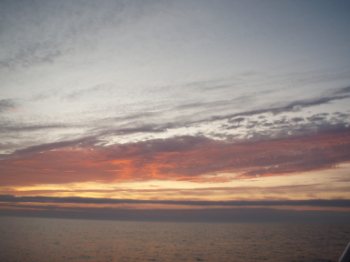 
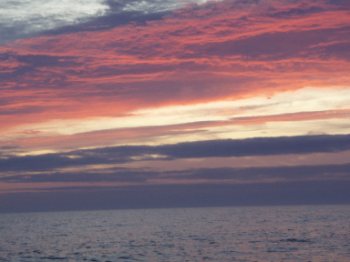 WHY IS THE SETTING SUN RED
?
When the Sun has dropped to within
about 5 degrees of the horizon, it passes through 10 times as much atmosphere as
it does when directly overhead, and we can look at it without being dazzled: a
great deal of its blue light has been scattered and it appears yellow. When it
reaches the horizon, the thickness of the atmosphere is 100 times that at the
zenith: the blue and green light are strongly scattered and the sun appears red.
The sky itself becomes red, especially if the atmosphere contains fine particles
of dust or water droplets in suspension. These particles reflect the Sun's light
and the sky is set ablaze. I ALWAYS have the camera on me, and usually fully
charged, I know when I am in for a spectacular sunset when I go on duty at six
and feel like I am in the finest rain, feeling the dew settle on me, at sea this
is of course salty and therefore incredibly sticky.
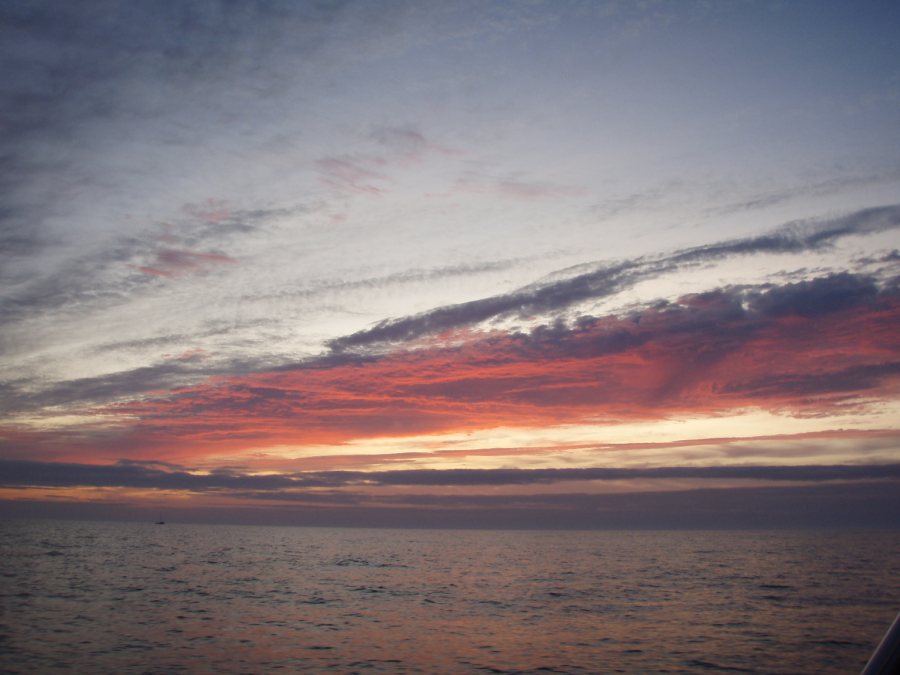 At sea I have no light pollution, in
fact I am usually alone exept for fishermen. Spot one on the horizon
about 7 miles from me.
FISHERMEN
Fishermen are always an observational
challenge, they change course often, sometimes show the wrong lights and
symbols. Pair trawlers can prove a bit perilous if they don't have their deck
lights on. Huge long nets, discarded netting, lobster pots with poor floats
and flags, you hear yachties berating them for being inconsiderate all the time.
We feel strongly that they are WORKING, we on the other hand are retired
and just bimbling about at sea, choosing when we go. We will always get out of
their way, even if we are under sail. Fishing the oceans is one of the most
dangerous jobs in the world, second only to professional logging. Mortal
accidents in the fishing industry are 20 to 30 times the general national
average in both the USA and Europe. Out of 15 million men working worldwide on
fishing boats, 24,000 accidental deaths occur every year. Many boats have little
in the way of first-aid or safety. We came through the lock once in
Plymouth and spoke to a lad who had been working at sea, since the age of
six, he inherited the boat from his father and had never learnt to read or
write. He is not unique.
Would you want to go out in all
weathers and sea conditions, add to that quotas on what you can catch, where you
fish and the weight you can bring in ?
We, on the other hand have
a CHOICE and therefore give the boys an awful lot of slack. We also
make a point to wave at each and every one of them. 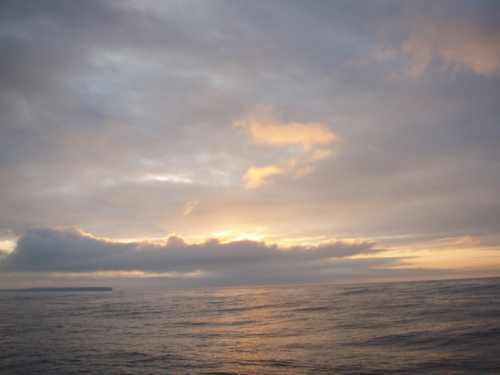 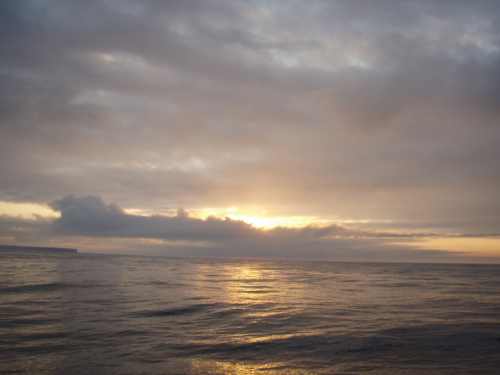 Sunrise at Point de
Sagres, Portugal en route to Lagos. I only ever see the faint glow of
daybreak, not sunrise on my normal 2 to 6 shift. When we left Sines we had a 16
hour journey so we split it into 4 x 4 hours from the time we left. This
meant I did a 4 to 8am shift, thus catching my first real sunrise at sea
ever.
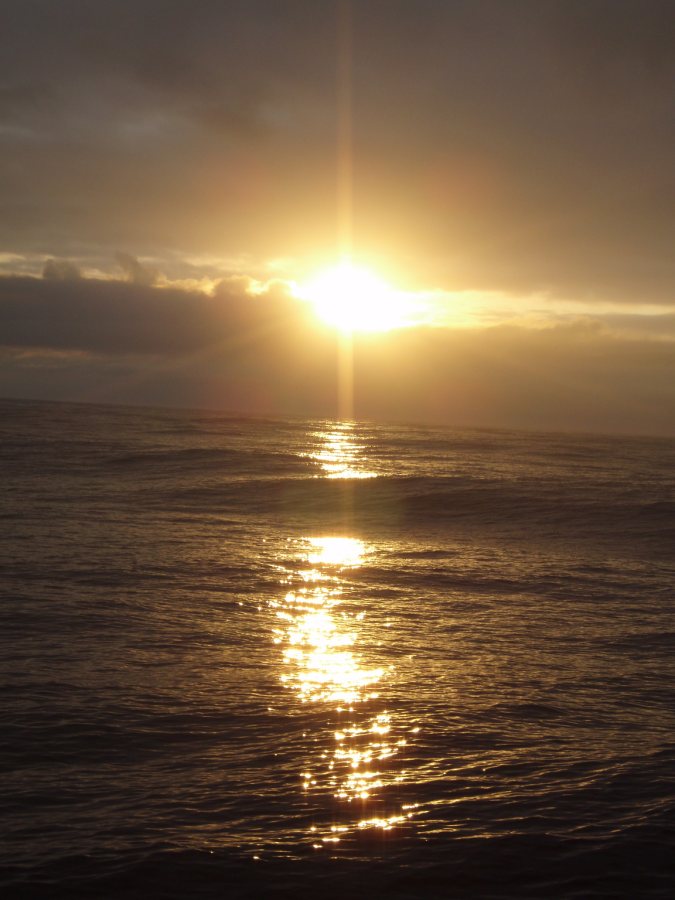 The camera is not good enough to be
able to take a full shot of the sun without making the surround much darker than
it should be. We like the photo nonetheless. When the sun is high in the sky it is actually WHITE not yellow as we
have always been taught to colour it in since childhood.
HOW DO WE PROVE THAT ?
In full daylight the Sun is too
bright to look at it directly to judge its colour, but we can form an image of
it with a magnifying glass or photographic lens and project the image onto a
sheet of paper: the image is white. The Moon, which simply reflects
light from the Sun back to us, looks white too. The same is true of clouds.
Obviously, the colour of sunlight for us SHOULD be white, the neutral colour,
because our eye was designed to work in sunlight. If our Sun was a cooler
planet or star, therefore redder, our eye would have adapted to this and we
would still see it as white.
We sleep when its dark due to the
Pineal Gland in the brain, also the effect of the Circadian Rythmn, we are
hunter gatherers and don't have great sight at night like owls do. You CAN get
used to being up at night however, nightshift workers or me on watch, but
it does take me a full half hour to fully get my bearings and best night
vision.
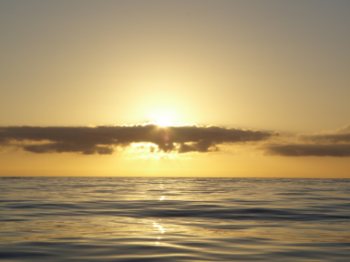
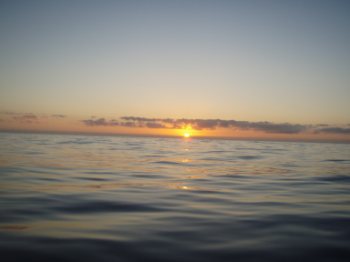 ENJOYMENT OR BOREDOM ?
People often ask us if we ever get
bored on watch with, in their mind's, nothing to look at or to do. Bear sits and
reads, looking up frequently to have a good look round. He enjoys sitting on his
perch on the starboard side between the winches. I on the other hand spend my
watch standing, on the port side, looking over the pram hood. I sometimes listen
to music and dance away to my hearts delight but often just enjoy looking
around. I am rarely truly alone. There are fishermen, chums ( container ships),
dolphins, luminescence, my trolling and fishing, logbook every hour and just the
sense of freedom, peace and quiet.
All in all I will continue to revel
in looking at sunsets and snap a few as I go along.
|